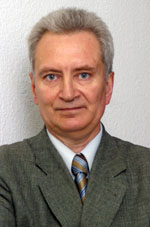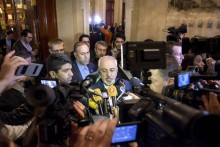The agreements reached between Iran and P5+1 (five UN Security Council permanent members: China, Great Britain, France, Russia, and the United States, plus Germany) on Friday drew a wide response in the world. Indeed, for the first time the global community managed to have Tehran agree to impose limitations on Iran’s nuclear program in exchange for the lifting of the West’s sanctions.
The importance of these agreements for Iran is shown by the fact that the press conference of the US President Barack Obama was broadcast live on Iranian television.
The Ministry of Foreign Affairs of Ukraine also welcomed the achievement of these agreements and expressed “hope for further successful development of the negotiation process with Iran in relation to its nuclear program and achievement of the comprehensive agreement in due time.”
 The Day addressed deputy head of History of Asian and African countries of the State Institute of World History at the National Academy of Sciences of Ukraine Viacheslav SHVED with a request to explain what kind of possibilities the Lausanne agreements open for Ukraine.
The Day addressed deputy head of History of Asian and African countries of the State Institute of World History at the National Academy of Sciences of Ukraine Viacheslav SHVED with a request to explain what kind of possibilities the Lausanne agreements open for Ukraine.
“I would like to point out that despite all the problems, which remain in the way of final comprehensive agreement with Iran regarding its nuclear program, the signing of the political framework agreement is a great success of the US and European diplomacies, which have cooperated in a coordinated way for many years and consistently acted, first of all, by means of economic pressure on Iran’s regime, especially during Mahmoud Ahmadinejad’s presidency, when Iran’s foreign policy was opposed to the entire global community. This policy of Washington and Brussels proved its effectiveness and finally forced the current leadership of Iran to agree to a compromise, which basically allows Tehran to preserve its nuclear program. First and foremost what the US is trying to achieve is to make Iran turn from a part of a large problem into a part of the solution of the problem. This is an incredibly complicated task. And if the incumbent American president and the EU leadership manage to achieve it, all of them should definitely be awarded several Nobel Prizes at once.”
How do you assess Iran’s role in the achievement of the framework agreement in general and in conclusion of the comprehensive agreement on the nuclear program in particular?
“A lot here depends on Iran. Unfortunately, Tehran continues its policy of expansion of the Shiite Islamic revolution in the Arabic world. Take the recent tragic events in Yemen, where Shiite gangs of Houthis virtually seized state power, ousted the legitimate president of Yemen from power, and did not allow to stabilize the situation and reach national agreement. Finally, it led to a direct military intervention of the Arab side led by Saudi Arabia in order to protect the people of Yemen and preserve stability and national unity of Yemen. All this is well known, but it seriously affects the Middle East area and the global arena in general.”
Western experts draw attention to the fact that there are a lot of problems when it comes to conclusion of the final agreement in 90 days. In particular, this relates to whether Obama will be able to overcome the resistance of the Congress, which opposes the agreement with Iran, and also to convince his allies in the Middle East that the agreement does not threaten their security.
“Now the ball is in Iran’s court. Tehran has to take specific steps to prove that this agreement is not a cover-up for continuation of its aggressive policy in the region. The signing of this agreement must be followed by steps towards cessation of direct interference in the affairs of Yemen, Lebanon, and Syria. Very complicated and hard work lies ahead, and it is utterly important that the position of the US is understood by Israel, as well as the Arab countries. Yes, Obama takes a great risk. But what is the other option: a full-scale war in the Middle East, another round of arms race, which can lead to appearance of new nuclear players? That is, to the appearance of nuclear weapons in, let’s say, Turkey, Egypt, or Saudi Arabia.
“I was present in early December in 2011 in Riyadh at the large forum ‘Persian Gulf and the World,’ where Saudi Arabia’s leaders directly stated that if Iran were to obtain the atomic bomb, they would have no other choice but to create nuclear weapons.
“That is, the fight on the foreign political front still lies ahead. And everything there will mostly depend on how the joint front of the US, the EU, the Arab League countries, Turkey, and Pakistan will force Iran to join the countries that abide by international law.”
What are the implications of the Lausanne deal for our country?
“The developments around Iran are directly relevant for Ukraine. Firstly, it is another demonstration that any aggressor or political or economic power, which defies international norms and laws and assaults others, or harbors aggressive plans concerning other nation’s territories, can be stopped and forced to take into account international laws with the help of broad-scale, efficient economic sanctions.
“And this directly relates to the present-day struggle of the Ukrainian nation against Russian aggression, for the preservation of own territorial integrity and sovereignty. It is of great importance for the EU, the US, and the entire civilized world, first of all, the North Atlantic Alliance: if they act concordantly and coherently, carrying out efficient economic sanctions against the incumbent Russian regime, the aggressor will be forced to retreat, sooner or later.
“Secondly, it is a matter of serious economic consequences. In fact, this agreement opens the doors to the European and global markets before Iran’s oil. It deals a serious blow to the international strategy of Russia, which wields its hydrocarbon weapon in order to force (primarily) the EU to back off, put up with its aggressive plans, and pursue a policy of indulging Russia’s growing appetite. Global gas and oil prices are falling, and it is a new blow to Russia which, I believe, can no longer disburse enormous sums on the preparation of new aggressions.
“Thirdly, these recent events and the signing of this framework agreement virtually severs Iran from Russia. For some reason I believe that, as much as I know Iranians, deep down they have never been hardened anti-Americans. I think that Iranians themselves are relieved with this deal, which opens the door to a most extensive, comprehensive cooperation with the European community, something they have been waiting for 15 years. I believe it will be a very serious positive result if Iran gradually breaks away from the orbit of Russia’s foreign policy strategy, which used Iran as a tool for pursuing its goals. We see it today, as Russia supports the Houthi rebels. And we know Saudi Arabia’s attitude to this question: the Saudis have multiple times explicitly mentioned Russia’s inadmissible role there.
“To sum it up, I can say that the framework agreement in Lausanne is a great contribution to the formation of the new global order, in particular, the regional order in the Middle East. However, there are quite serious problems with the attitude of Israel and some Arab nations, first of all, the Gulf countries who consider Iran their arch-enemy and are painfully suspicious of the deal, which does not fully exclude creation of nuclear weapons. Most importantly, the deal does not automatically stop Iran’s aggressive foreign policy in this region, especially regarding the Arab world. We are in for some very tough struggle to make Iran turn into a pillar of stability in the region.”
What opportunities does such a turn open for the economic cooperation between Ukraine and Iran, now that there still are certain limits on Ukrainian export to this country?
“Obviously, such a deal can boost the development of Iran’s relations with Ukraine. I remember well the time when president Khatami was in office, more than 15 years ago. Over this time the global energy map has changed considerably, new opportunities have appeared, including shale and liquefied gas. So, a question arises: can the projects of the early 1990s, dealing with transportation of Iran’s oil and gas, be relevant for Ukraine now? They need to be reconsidered and adjusted. This must be done without any haste, but with thorough analysis and detailed calculations and with a new scheme of energy flow in Europe and in the Pontic-Caspian region. All of it must be taken into consideration. Of course, it allows us to extensively develop our relations now in highly technological branches like aircraft engineering, machine building, or dual-use technology. Now we can use Iran’s market with new force and energy. There is a wealth of opportunities for applying our intellectual potential and capabilities in order to cooperate with Iran in developing a number of strategic issues, including the new version of the Great Silk Road, which is now being developed by China. I think Iran will also be widely involved in the implementation of this plan. Ukraine, too, could make a considerable contribution to the development of this project.”
How can you comment on the cautious statement made by Ukraine’s foreign ministry in Lausanne?
“Maybe it was right. This is a very delicate issue. Ukraine set many a tooth on edge in its time. Suffice it to remember the events when Madeleine Albright held office as Secretary of State, when Kharkiv Turboatom plant was roughly stopped to prevent building the great turbine for Iran’s power plant in Bushehr. Now we know better. The thing is that the Iran question was solved, unfortunately, without Ukraine. Everything was decided by the US and EU. That is why to some extent we have lost interest in that country, in the extensive analysis of the developments, and we no longer have a clear idea of what is going on there. Thus, such a response from our foreign ministry is quite natural.”








